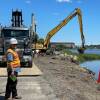Chelsea, Revere and Winthrop are launching a cooperative project to understand how climate change will specifically affect low income residents, people of color and other vulnerable residents.
The communities announced last week they are seeking to hire a consultant to conduct a Social Vulnerability Assessment through a new joint regional climate change project, the North Suffolk Office of Resilience and Sustainability.
Ultimately, the aim is to find gaps in the region’s approach to combatting climate change, centered first and foremost around the communities likely to be most affected by it, and then form recommendations about how to take them on.
The project is driven by the idea that, in order to proactively respond to the toll the changing climate will take on the region, first the region needs to understand who that toll will be taken on.
The communities are gathering data and trying to “analyze it and make that more transparent and accessible to really understand how climate vulnerability and social vulnerability to climate is happening,” said Cameron Peterson, the director of Clean Energy at the Boston-area regional planning agency Metropolitan Area Planning Council.
Both the office and the new assessment are funded by grants from MAPC and the Boston climate and education-focused Barr Foundation (which is also a GBH donor). The North Suffolk office, funded through 2022, develops regional projects to help Chelsea, Revere and Winthrop cope with and respond to the encroaching impacts of climate change.
For evidence of the impacts of structural racism and discrimination on people’s lives and livelihoods, skeptics need not look further than how COVID-19 hit Chelsea, says Roseann Bongiovanni, the executive director of the local Chelsea environmental organization GreenRoots. Infections in Chelsea reached six to seven times the state’s levels, she said.
"We always thought it was only climate and not necessarily a pandemic, and yet 18 months ago and throughout much of that pandemic, Chelsea was hit worst," Bongiovanni said. “That's really about structural racism and discrimination that has led to our community and communities like ours being so disproportionately burdened by years of environmental and public health threats.”
“As we see the tides rise, the sea rise, flooding become more and more prevalent, erratic weather becoming much more regular and heat impacts, it’s low income people and people of color who are being hit hardest and worst,” she said.
Environmental impacts are already being felt, even as the local governments look to head off the worst impacts and understand gaps in their plans.
“In those heavy winter storms in 2018, we already saw significant flooding,” Bongiovanni said. “The area that's by the New England Produce Center was almost underwater. ... We saw flooding at the Burma Road housing development, at the Mace public housing development, in our neighborhoods.”
But mitigating the impacts of climate change — and, crucially, the ways in which such mitigation is done — is key for communities in Suffolk county to survive and thrive.
“The science shows that there are some climate changes and impacts that are underway — that are going to happen because of all that we've been doing to put fossil fuel and greenhouse gas emissions into the atmosphere over the last decades,” Peterson said. “But there's a good deal we can do to help be more resilient and adapt to those changes, and there's a good deal we can do to prevent much more from happening.”
A contractor is set to be chosen within the next month. The selected group will be expected to compile a report on its findings by April 2022 and submit strategic recommendations by June.
The multi-city office and its projects “also provides a really good incubator,” Peterson added. “It's a great example of how communities can work in more of a regional way. … We're hopeful that a lot of the lessons can then be shared and learned and disseminated, among others, in our region.”









